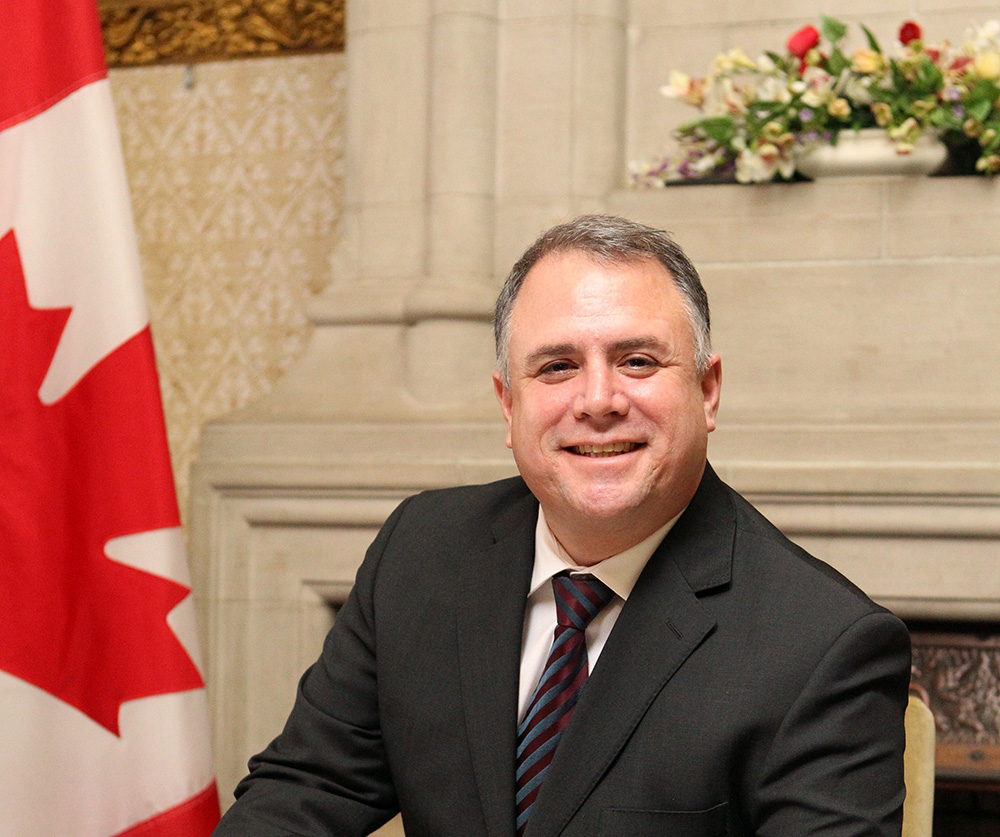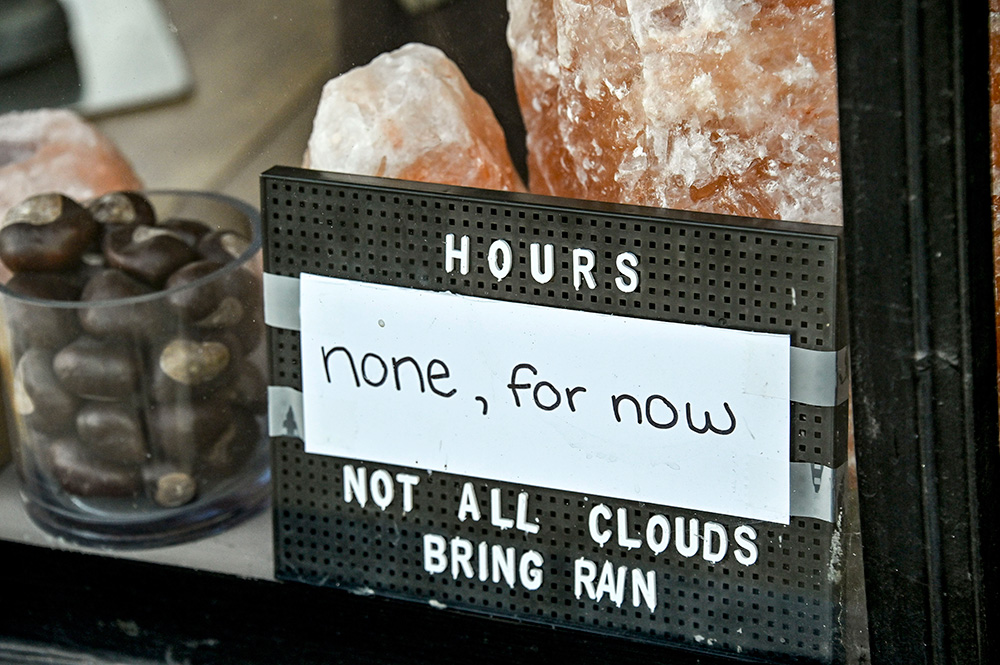“I have never seen anything even close to this,” said Dan Kelly after a long day at the office last week, echoing what every Canadian is feeling these days, trapped in the lockdown of the global COVID-19 pandemic that shows no sign of ending any time soon.
The Winnipeg-born president, CEO and board of governors’ chair of the Toronto-based Canadian Federation of Independent Business said the volume and depth of heartbreaking, tear-filled stories small business owners have shared with him and his staff has been increasing and intensifying as the crisis continues.
A business help line, run by the CFIB, normally fields calls related to Canada Revenue Agency matters. They’re now all COVID-related.
“We typically take 50 calls a day from members, and now we’re up to 800 a day,” Kelly explained. “In a year, we might have one member that’s desperate enough to talk about taking their life." In one recent week, “we had five.”
Last week, the CFIB released the result of an online survey of 9,678 of its 110,000 small and medium-sized business members that found the average cost of the COVID-19 crisis on their operations had already been $160,000 — and that 46 per cent are partially shut down; 31 per cent are fully closed; and only 21 per cent remain open.
“Of those that are shut down, 32 per cent said they were not sure whether they will ever reopen. Right now, they have most or all of the costs of running the businesses, and in many cases zero income,” said Kelly, who joined the CFIB in 1994 as a policy analyst.
“Communities are affected because they are not able to benefit from the local independent business in their backyard. Employees are deeply affected because they are either temporarily unemployed or potentially permanently unemployed. And the business owner is often seeing their lifelong dreams and retirement savings essentially evaporate because most owners rely on the value of their business to fund their retirement.”
“The tail effect of this is going to be much, much longer. Every day that goes by that this problem continues, more and more businesses are falling victim and tens of thousands of employees are pushed out of work.”
As the COVID-19 shutdown drags on, the federal government must do more to prop up small businesses, who employ millions of Canadians, in order to stave off a long and deep recession keeping millions out of work, warn experts. A number of small business owners told The Tyee federal supports are too little, too restrictive and too slow in coming to save their businesses. The federal Conservative and NDP parties are urging the Liberal government to do more.
And a veteran economist predicts that if the economic toll of pandemic measures continues to steeply mount, so will divisive doubt about whether the lives saved are worth derailing the financial futures of so many other Canadians.
British Columbia NDP MP Gord Johns, speaking to The Tyee, framed the crisis this way: “Small businesses are the job creators and economic generators in our communities,” but too many already are “filing for bankruptcy, and they’re walking away. And we’ve got to stop that.”
‘No government program could replace the jobs’: Poilievre
“Small businesses are drowning and they desperately need a life raft,” warned Pierre Poilievre, the federal Conservative shadow minister for finance, at a Sunday news teleconference in Ottawa.
He said that as a result of government shutdowns, “revenues for many of these businesses have fallen by 100 per cent.”
“Let’s remember that the working class in this country might rely on government for a social safety net, but the only thing keeping them falling into that net in the first place is a job at a small business,” he said, listing everyone from trade apprentices and hair stylists to clerical workers.
“Small businesses are the springboard out of poverty for kids from troubled backgrounds who need to pay their way through university by working part-time at restaurants or at retail outlets,” said Poilievre, an Ottawa member of Parliament, who served as minister of employment and social development in former prime minister Stephen Harper’s government.
“If a third of businesses never reopen, there will be millions of middle-class people who will fall deeply into poverty and no government program could possibly replace the jobs that they will have permanently lost.”

Some business owners are wondering whether they will be able to ride out the unprecedented health and economic crisis.
Dental hygienist Shannon McFee closed her downtown Ottawa boutique, Confident Smiles, a sole proprietorship, on March 16.
Factoring in her personal savings, McFee, who has been a hygienist since 1999, believes she could ride out two months of not operating.
“At the three-month mark, I could use a line of credit — but at that point I’m going to have to start to look at whether it’s worth it in the long run,” she said. “I’m 46 years old and if I’ve got twenty, thirty thousand dollars more in debt to pay, how long is it going to take me to pay that it off before the business is actually going to be profitable again? There will be a tipping point where you’re putting money in it to keep it alive.”
Should Confident Smiles close, McFee worries that at her age, she would have trouble finding a job as a dental hygienist elsewhere. Should it reopen, she’s concerned about the availability of health-care supplies once Ontario’s state of emergency is lifted.
“I’ve donated masks and disinfectants,” said McFee, who passed them along to a nurse-friend.
In Alberta, a family-owned business that makes commercial signs and vehicle wraps is also doing a community service by producing and selling COVID-19 social-distancing decals while the eight-year-old storefront operation struggles to stay afloat.
Oil City Signs, located in St. Albert just outside Edmonton, locked its doors last month but still takes online orders that are desperately needed.
“We have laid off our staff and are our downsizing our space to cut our expenses as much as we can because this isn’t going to go away in the next couple of weeks,” said Julie Quantz-Kovac, who with her husband, Joe Kovac, established the company eight years ago in the basement of their home.
She explained that as revenues drop, their three employees, two of whom are family members, were let go so they could apply for the Canada Emergency Response Benefit, or CERB, and derive some income. Old City, which has occupied a 5,000-square-foot shop since 2016, will only rent half of the building going forward. Both measures, Quantz-Kovac estimates, will save the business about $20,000 a month.
However, sales have dramatically fallen. “The problem is that a lot of our customers are closed and nobody is ordering anything,” she said. “We’re looking at an 80 to 90 per cent loss of our sales.”
“The spring is our busy time, so this is killing us,” added Quantz-Kovac.
‘Get ready to rehire people’: finance minister
Bill C-13, the COVID-19 Emergency Response Act, provides for the emergency workers’ benefit. The federal government also has proposed a Canada Emergency Wage Subsidy for employers that would cover 75 per cent of employee wages for up to 12 weeks, retroactive to March 15, 2020.
Federal Finance Minister Bill Morneau estimated both measures would cost $95 billion, and sent businesses the message to “get ready to rehire people.”
Kelly, whose organization pushed the government last month to hike the originally planned 10-per-cent wage subsidy to the current level, said that employers wanted a program that would allow them to keep staff on the payroll and spare them having to apply for EI or the emergency benefits.
“This is not just a normal recession,” he explained. “This is essentially a temporary shutdown of a huge swath of the economy, taking otherwise healthy businesses out of action.”
A problem now with the wage-subsidy program is timing. “Money won’t start rolling out to businesses for six weeks,” said Kelly. “That’s three paydays from now, and if your income is zero, there aren’t that many businesses that are going to be able to make it and will cease to exist by then.”
To expedite the process, he offered, is for the federal government to rejig the employment insurance program to send money sooner to employers, who normally remit premiums on their employees’ behalf.
Also problematic with the wage subsidy is a requirement that employers must “attest” to at least a 30-per-cent decline of their revenue.
“That is adding a fairly significant hurdle to a lot of businesses who are not even sure where things are going from day to day,” said Kelly, who is lobbying the federal government to remove that prerequisite. “To get the subsidy, you have to keep your employees on staff and pay them. And if the CRA says there’s not enough evidence [regarding the decline] and wants the money back, it would bankrupt your business.”
“My point to the government is that if you’ve been ordered to shut down your business, can’t we just assume you’re being deeply affected?”
He believes the U.K. government got it right last month when it announced that it would pay 80 per cent of the wages of workers of companies without the revenue-drop condition attached.
The Tyee has also been contacted by people complaining small businesses less than a year old do not qualify for the federal wage subsidy. It is common for startups to carry heavy debt in their first year while building clientele, rendering them vulnerable to an unforeseen financial shock.
‘So many entrepreneurs will fall through cracks’: Johns
On Sunday, British Columbia NDP MPs Gord Johns and Peter Julian sent a letter to Morneau and Small Business Minister Mary Ng calling for improvements for support to small businesses during the pandemic. They would like the government to drop the 30-per-cent wage-subsidy revenue requirement for small and medium-sized enterprises with fewer than 50 employees.
“Many organizations have grown significantly in the past year or are seeing significant spikes in revenue right now,” wrote Johns, who serves as his party’s critic for small business, and Julian, the NDP’s finance critic in the House of Commons.
“In either case, neither would qualify for the wage subsidy but still need the support to get through the next couple of months. Removing this requirement would remove a significant amount of uncertainty.”

Poilievre believes the CERB and/or the wage subsidy should be extended to small-business owners, who pay themselves with dividends, and since they are not considered employees, do not have the $5,000 of qualifying employment income — or any wages to also qualify for the wage subsidy.
He noted the CERB also “effectively bans workers from taking on extra hours. If they earn any money during the period when they’re receiving the benefit, they lose the benefit all together.”
During a conference call with journalists last week, federal Conservative Leader Andrew Scheer told The Tyee that his reading of the wage subsidy suggests that small-business employers must pay wages upfront before applying for it.
“For businesses that have seen a 30 to 90 per cent reduction in revenue, we’re hearing that many of those businesses don’t have the cash-flow to pay wages first and get the subsidy later,” he said, adding that the official Opposition Conservatives will be pushing the government to reverse that process and give businesses the subsidy at the front end.
The Tories also want the government to refund the GST payments businesses have made over the past six months, which Poilievre said could take days to do and would “put a massive injection of cash into the hands of businesses who have been forced to be closed and who do not have employees or customers right now, and who have desperate need to pay urgent bills.”
A costing note, released by the Office of the Parliamentary Budget Officer on Monday, estimated the cost of refunding GST collected in 2019 to small businesses at $12.9 billion.
The Canada Emergency Business Account program, which will give SMEs and not-for-profits interest-free loans of up to $40,000 to cover such costs as payroll, rent, insurance and utilities and is being administered by Export Development Canada (given domestic powers during the crisis), needs to be broadened too, say the federal Conservatives.
“On the list of approved lenders are the big banks, but only 11 of 239 credit unions across Canada,” said Michael Cooper, the Conservative deputy shadow minister for finance, in an interview.
“A lot of small businesses use credit unions and effectively they are going to be shut out in terms of their ability to access these vital loans that could make a difference between them staying in business and shutting their doors,” said Cooper, MP for the Alberta riding of St. Albert-Edmonton, who also highlighted that no credit unions in his home province are on the list.
Morneau has said the program is designed to “support the Main Street businesses that give our communities their character, the local restaurants, the corner coffee shops, the small travel agencies, the salons and barber shops and many other small businesses that help form the backbone of Canada’s economy.”

The NDP would like the government to remove the requirement that SMEs must have paid between $50,000 and $1 million in total payroll last year to qualify for a loan so that sole proprietors, who had a lower payroll, could still access the program.
In their letter to Morneau and Ng, Johns and Julian want the government to give SMEs $10,000 rather than forgive that amount if $30,000 is fully repaid by Dec. 31, 2022.
“So many entrepreneurs will fall through the cracks if the government doesn’t make adjustments,” said Johns, MP for the central Vancouver Island riding of Courtenay-Alberni, in an interview.
“Britain, Denmark, Ireland, France and Spain have rolled out programs that don’t have bureaucratic criteria that makes it a lot easier for small businesses — and the United States is giving businesses 250 per cent of their average monthly payroll to cover rent, utilities and staff.”
He said that the red-tape attached to the Canadian emergency loan program will mean that business owners, such as those in the construction industry that hire contractors, won’t qualify because they don’t have their workers on a payroll.
Landlords are small-business people, too
Johns has some firsthand experience of what it’s like for a small business to fall on hard times.
Ecoeverything, a natural clothing retail company he ran that had stores in Whistler, his hometown of Tofino and his birthplace, Victoria, fell victim to the 2008-09 recession and ceased operation in 2010.
“I remember as clear as day what it felt like when sales dropped 75 per cent in our Victoria store, and the first thing I thought of was how my staff and family were going to get through it. I couldn’t believe how all of our hard work had just vanished right before our eyes,” said Johns, who also served on the town council and ran the chamber of commerce in Tofino.
“We didn’t survive that recession — but that pales in comparison to what people are facing right now. There’s just no revenue, and there’s no way out for them — there’s no hope at all and the landlords are still asking for rent, for the most part,” he explained.
“A lot of people are making the decision now and filing for bankruptcy, and they’re walking away. And we’ve got to stop that. Small businesses are the job creators and economic generators in our communities.”
According to the Tourism Industry Association of Canada, nearly 10,000 jobs in Johns’ riding are tourism-related; almost all of the employers are small businesses.
“We’re heading into our tourism season, and to lose a few days takes months to recover,” he said. “To lose a week in peak season, might take a year. But to lose what could be a couple of months, might take a couple of years to bounce back.
“This is devastating.”
Details of the government’s COVID-response package for businesses must obtain parliamentary approval by way of amending Bill C-13, and the Liberals will need opposition support before aid money starts flowing.

There will need to be some compromises, such as on the 30-per-cent revenue-decline requirement for the wage subsidy, which Poilievre said is “a problem because a lot of businesses that are suffering will not be able to show that drop,” and explained that they either don’t keep month-to-month revenue records or new startups don’t have a previous year in which to compare revenues.
“Businesses that are on the verge of bankruptcy are often doing fire sales of their inventory and assets, which makes them lose money in reality but artificially boosts their revenue and renders them ineligible for the subsidy,” he told reporters on Sunday.
He suggested the government should instead consider giving small business options beyond simply revenues for which to qualify for the subsidy, such as earnings, subscription or orders.
No date has been set for the Commons and Senate to reconvene, but on Sunday, Government House Leader Pablo Rodriguez sent Commons Speaker Anthony Rota a letter requesting virtual sittings of the lower chamber.
The Tyee sought federal government comment, but was unsuccessful in interview requests for Prime Minister Justin Trudeau, Ng and Morneau. Meanwhile, businesses wait for a break in a lockdown that is jeopardizing their very survival.
That includes a group not normally considered: landlords — many of whom are “small-business people or average residents that own a property and live off the income,” as the CFIB’s Kelly pointed out.
“What businesses need right now is somebody who can take away the bills and not to just defer the payment of bills. The two big expenses for firms are wages and rent or real estate,” he said.
“The cost of protecting society is being borne by taking away the livelihood of Canadian businesses by shutting them down.”
Said Kelly: “I deeply worry that we will see a hollowing out of main streets. I don’t think we want every street corner to have the Gap and other large multinationals. We need to have a healthy number of independent, locally-owned businesses.”
“Those are the ones that do their best to hang onto their people, and while their wages may not be market-leading, they offer a bunch of other benefits to society.”
Economist: ‘What price are we willing to pay?’
Veteran economist Philip Cross believes the federal government’s overall economic response to the COVID-19 crisis has treated small businesses as an “afterthought” by only offering loans or deferrals.
He said the government should have suspended the collection of payroll and sales taxes for small businesses still faced with paying property taxes, which municipalities rely on for their main source of revenue.
“We have health-care people making decisions with profound economic consequences and they don’t seem to be aware of these consequences. To them, it’s just ‘let’s save a life at all costs,’” said Cross, a senior fellow at the Macdonald-Laurier Institute, an Ottawa-based think tank.
“I think economists are getting increasingly frustrated with this — we can’t shut down our economy forever. At some point, you have to say, ‘Okay, it’s people over 60 who are largely at risk and we’ll keep them indoors.’” But at some point, we’re going to have to reopen our economy, or we’re not going to have an economy.”
“At some point, we also have to ask: At what price are we willing to pay to save everybody?” offered Cross, who spent 36 years at Statistics Canada specializing in macroeconomics, and served as chief economic analyst there from 2008 until 2012.
“Society does put a price on life. We do not devote 100 per cent of our GDP to health care because we want to be able to enjoy other things that make life worth living. Extending life, just for its own sake, is not an option — yet in this instance, that’s what we seem to be doing. We’re going to devastate the economy to save 15,000 lives in Ontario,” he said.
“If you take the total cost of all of this and divide it by 15,000, what is the price of life we’re attaching? It’s tens of millions of dollars.”
Cross said that most Canadian economists were willing to go with the business shutdown for the first three weeks. “The government botched the travel bans; they didn’t screen people properly at airports and didn’t isolate them.
“And here we are, more than three weeks later, and the health-care system continues to demand more and more prolonged closures.
“They didn’t get their medical supplies ready. And they are not communicating the severity of this to the public properly, perhaps because the public properly sees that this isn’t that severe, especially if you’re relatively young,” said Cross, who testified before the Commons Standing Committee on Finance via teleconference last Friday on the government’s response to the COVID-19 pandemic.
“It’s a lot to ask people to give up their lives and stay indoors 24 hours a day so that granny doesn’t get a severe flu.”
“If this goes on long enough, the risk of mass civil disobedience can’t be ruled out.”
He acknowledges that amid the chorus of calls for physical distancing and self-isolating, his voice is in the minority.
But 65-year-old Cross, whose mother was a nurse, expects the COVID-19 crisis will create a greater generational divide.
“I’ve talked with millennials about this, and they’re saying, ‘My future is being ruined — for what?’” he said.
In the meantime, Dan Kelly of the Canadian Federation of Independent Business braces himself for more tales of distress like the one from a longtime Montreal deli owner, who told him that he had to let go his employees, who worked for him from 30 to 50 years, because the restaurant, which also caters to a seniors’ crowd, has been shuttered.
And Oil City Sign’s Quantz-Kovac hopes for a “new normal” emerging post-pandemic that will involve “a start over from the beginning” for businesses, like hers.
“Every time the phone rings with an order, my heart jumps — it’s so exciting,” she explained.
“You get so complacent when things move along in normal times, and then all of a sudden it’s all gone. Now you appreciate those customers who are still calling you.” ![]()
Read more: Local Economy, Coronavirus
















Tyee Commenting Guidelines
Comments that violate guidelines risk being deleted, and violations may result in a temporary or permanent user ban. Maintain the spirit of good conversation to stay in the discussion.
*Please note The Tyee is not a forum for spreading misinformation about COVID-19, denying its existence or minimizing its risk to public health.
Do:
Do not: